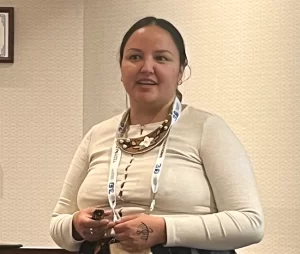Wiikwemkoong member hoping Indigenous people follow suit and request intervenor status

By Sam Laskaris
NIAGARA FALLS – Kaella-Marie Earle encouraged attendees at a recent conference, TechNations 2025 – Empowering Future Generations: 30 Years of Service and Innovation, to get involved in various energy and mining projects.
Earle, a member of Wiikwemkoong Unceded Territory, was a speaker at the Ontario First Nations Technical Services Corporation (OFNTSC) conference, which wrapped up on May 13 in Niagara Falls.
Earle’s session was titled, Enhancing Indigenous Oversight and Regulatory Intervention in Service of Free and Prior Informed Consent.
Earle, an engineer with Enbridge, is also the vice-chair of the Indigenous Advisory Committee of the Canada Energy Regulator, which helps to guide Indigenous inclusion and the implementation of the United Nations Declaration on the Rights of Indigenous Peoples (UNDRIP).
During her presentation, Earle discussed the importance of empowering First Nations to assert their rights on projects that are occurring on their lands.
To this end, she brought up the importance of having Indigenous people request intervenor status for hearings that will determine the fate of various projects.
“I don’t see enough Indigenous people involved in Ontario Energy Board proceedings,” Earle said.
She added that individuals simply need to apply to have this role.
“They will actually, in many cases, provide funding for you to do that and be involved in the legal proceedings associated with getting an energy project approved and Ontario,” she said. “I almost never see First Nations there. And oftentimes, what they’ll do is they’ll depend on energy companies to provide information about how they consulted. And I think it’s actually better for us to be in those proceedings and those developments directly, so that the information comes from us instead of through energy companies.”
Earle said involvement from Indigenous people can assist on whether to deny or approve certain projects.
“You can listen to the live broadcast or even be right in the hearing,” she added. “You can participate in the oral hearing. So, you can ask questions of all of the people who provide the evidence as part of their application. You can present evidence.”
Earle added that Indigenous people can also respond to questions about evidence presented at board hearings.
“Having our own people there to answer questions about the important things about the area where the project is happening, that’s so important,” she said.
At times, Earle said, Indigenous community members are the best ones to provide details such as culturally relevant information.
“I’d really like to see some of your faces in that room in the future,” Earle said as part of her desire to have others join her and apply to have intervenor status in the province. “There’s so many major energy projects. And I know that our Nations would benefit from sitting at those tables. And so would the province.
“This is what it’s going to be required for us to make sure that all the mining and energy projects that are being accelerated right now by the Ford government are going to be done properly and in accordance with our rights.”
The OFNTSC was established in 1995. Its mission includes providing technical advisory services to First Nations throughout the province.


